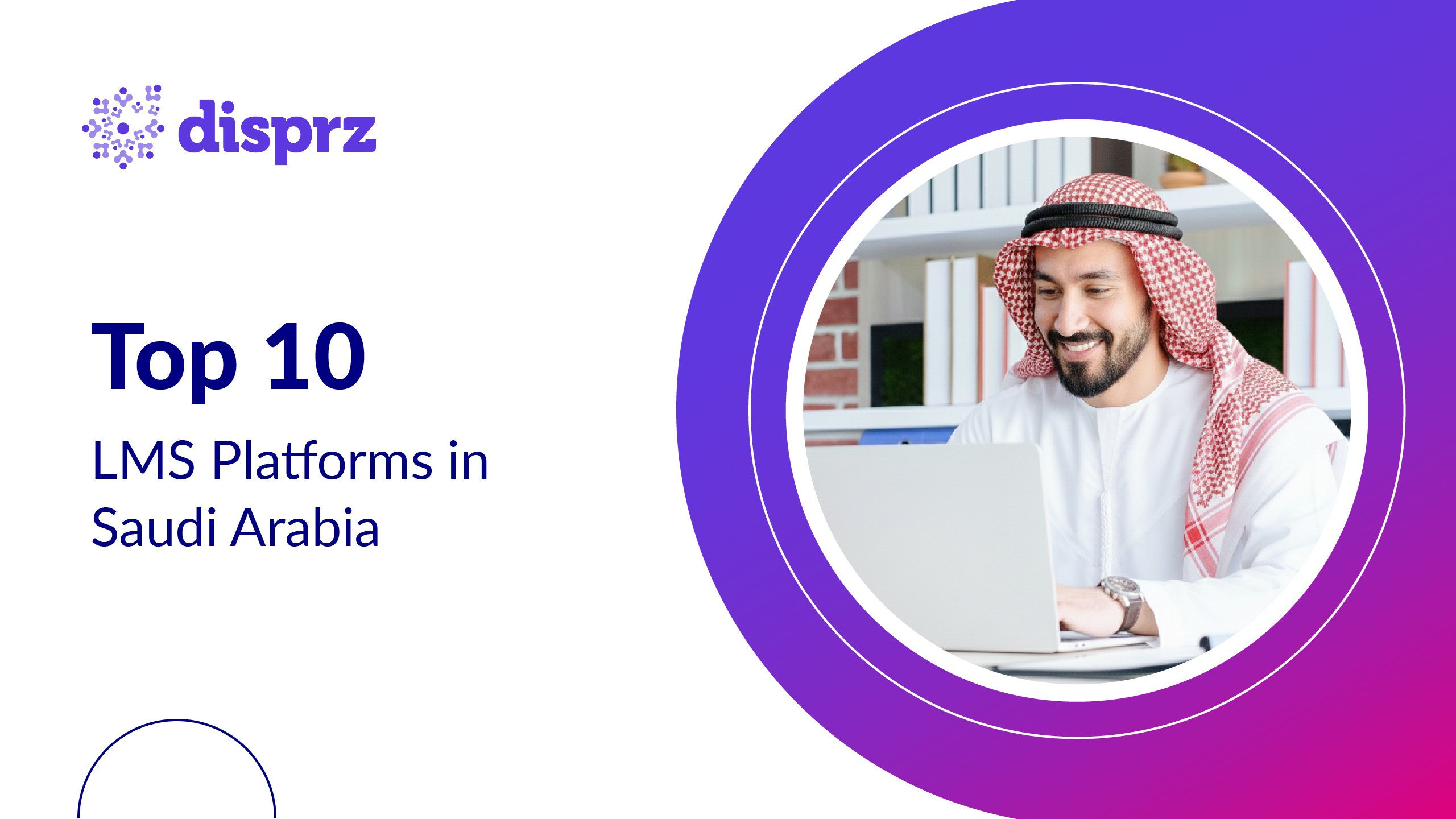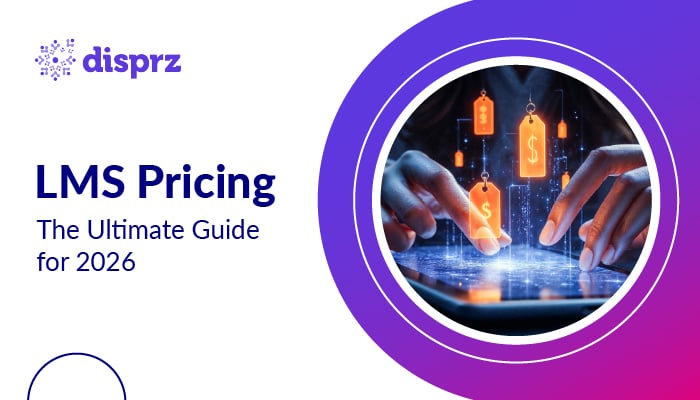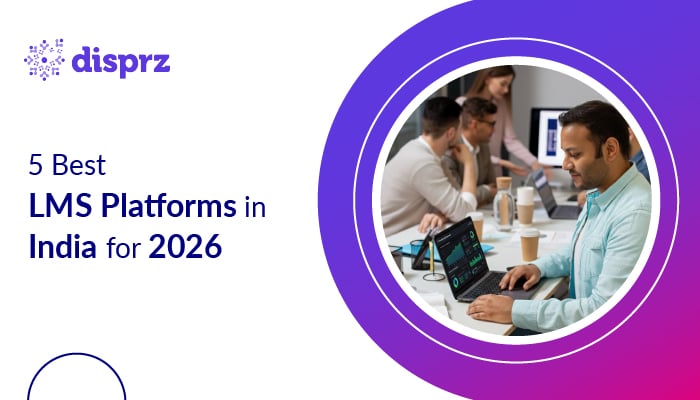Saudi Arabia’s push toward Vision 2030 has turned learning platforms into critical infrastructure. This guide looks at the top LMS platforms used in the region, evaluated for Arabic support, compliance readiness, pricing models, and how well they align with national transformation goals, along with a practical buyer’s lens to help leaders choose wisely.
As Saudi Arabia accelerates its Vision 2030 agenda, learning has moved from a support function to a strategic lever. Workforce upskilling, nationalization goals, and sector-wide capability building now depend on digital learning systems that can scale fast, localize deeply, and prove impact. A Learning management System (LMS) in this context is a part of how organizations deliver productivity, compliance, and future-ready skills.
Yet, the choice is not straightforward. Many global platforms struggle with robust Arabic support, local compliance requirements, and the realities of large, distributed workforces across government, semi-government, and enterprise sectors. At the same time, local and regional providers vary widely in maturity, analytics, and AI readiness.
This blog highlights the leading LMS platforms used in Saudi Arabia today, examines how they align with Vision 2030 priorities, and offers a clear buyer’s guide to help HR and L&D leaders identify the right fit for their organization’s next phase of growth.
Why Are Saudi Organizations Investing in LMS Platforms? (Vision 2030 Drivers)
Several factors unique to Saudi Arabia are accelerating the shift to enterprise LMS platforms. Vision 2030 elevated capability building from a support activity to a national mandate, pushing organizations to scale skills faster, standardize learning, and show measurable progress across large and diverse workforces. At the same time, regulatory pressure, localization needs, and rapid workforce expansion have made traditional training models too slow and fragmented to keep up.
- Vision 2030 capability mandate
National transformation programs require organizations to build future-ready skills at scale, not in pockets. LMS platforms provide the structure to align learning with sector priorities and long-term workforce goals. - Compliance and regulatory intensity
Industries such as government, BFSI, healthcare, and energy must deliver consistent, auditable training across regions. A centralized LMS simplifies governance while reducing operational risk. - Arabic-first and bilingual learning needs
Effective learning in Saudi Arabia depends on strong Arabic support alongside English. LMS platforms are increasingly evaluated on localization depth, not just language availability. - Rapid hiring and Saudization goals
Growing national talent pools and giga-project hiring cycles demand faster onboarding and time-to-productivity. Digital learning systems help compress ramp-up timelines. - Rising expectations for measurable impact
Leaders are moving beyond completion rates toward outcomes like performance improvement, skill readiness, and productivity—metrics that modern LMS platforms are designed to support.
How is Vision 2030 fueling corporate learning & development?
Vision 2030 has reshaped how organizations in Saudi Arabia think about learning and development. As the country focuses on building a knowledge-driven, globally competitive economy, capability building has moved to the center of organizational strategy. Enterprises are expected to develop local talent at speed, support new sectors, and continuously upgrade skills as work itself evolves. This shift has made traditional, classroom-heavy training models insufficient, creating demand for modern, scalable L&D infrastructure such as LMS platforms.
-
Human capital as a strategic growth lever
Vision 2030 positions workforce capability as a prerequisite for national competitiveness, pushing organizations to invest in continuous, structured learning systems. -
Emergence of new industries and roles
Rapid sector expansion is creating skills that did not previously exist in large numbers, requiring flexible learning platforms that can evolve quickly. -
Government-backed workforce development initiatives
National and sector-level programs increasingly emphasize standardized, trackable learning, encouraging adoption of digital L&D platforms. - Acceleration of local talent development
Organizations are onboarding and developing Saudi nationals at scale, increasing the need for faster ramp-up and guided skill progression. - Stronger expectations for accountability
Leaders now expect learning investments to translate into readiness, performance, and measurable business outcomes signals that modern LMS platforms are designed to deliver.
What do young, tech-savvy Saudi employees expect from training?
Saudi Arabia’s workforce is increasingly young, connected, and digitally fluent. Many employees entering organizations today grew up with smartphones, on-demand content, and personalized digital experiences. As a result, their expectations of workplace learning look very different from traditional classroom sessions or static online courses. Training is expected to be relevant, easy to access, and embedded into the flow of work.
- Mobile-first, always-on access
Learning is expected to work seamlessly on phones and tablets, fitting around work rather than being scheduled around training calendars. - Interactive and engaging formats
Short videos, quizzes, simulations, and social learning matter more than long presentations or document-heavy courses. - Personalized learning paths
Employees expect training to reflect their role, career aspirations, and current skill level, not one-size-fits-all programs. - Just-in-time relevance
Guidance is most valuable when it appears at the moment of need, during tasks, decisions, or problem-solving and not weeks in advance. - Clear progress and growth signals
Visibility into skill development, certifications, and career progression builds motivation and trust in the learning system.
Why is full Arabic language support essential in an LMS?
In Saudi Arabia, language plays a central role in how learning is accessed and applied at work. An Arabic LMS helps organizations deliver training that feels intuitive, inclusive, and aligned with how large parts of the workforce read, interact, and make decisions. When learning systems reflect linguistic and cultural context, adoption improves and training becomes easier to scale across roles and regions.
- Arabic user interface and navigation
A well-designed Arabic LMS offers a complete Arabic experience across menus, dashboards, notifications, and assessments, supporting consistent usage across the organization. - Right-to-left (RTL) experience
Native RTL design ensures layouts, progress indicators, and forms follow natural reading patterns, improving usability and comfort for learners. - Localized learning content
Arabic language support extends to examples, scenarios, and terminology that resonate with local workplace contexts and regulatory environments. - Broader workforce reach
Arabic-enabled platforms allow organizations to include frontline, operational, and knowledge workers within a single learning ecosystem. - Clearer communication and understanding
Delivering learning in Arabic helps ensure clarity, especially in areas such as onboarding, compliance, and role readiness.
|
LMS Capability Area |
Arabic Support Focus |
|---|---|
| User experience |
Arabic UI across learner and admin views |
| Content delivery |
Arabic courses, assessments, and resources |
| Interface design |
Right-to-left layouts and workflows |
| Workforce coverage |
Applicable across diverse employee groups |
| Learning outcomes |
Improved clarity and engagement |
How do Saudi regulations (e.g., PDPL) impact LMS requirements?
Regulation has become a defining factor in how learning systems are selected and deployed in Saudi Arabia. As organizations handle growing volumes of employee data and operate under stricter oversight, learning platforms must do more than deliver content. They need to support compliance, traceability, and governance by design. This is where LMS platforms increasingly serve as part of an organization’s risk and control framework.
- Data protection and privacy (PDPL)
Saudi Arabia’s Personal Data Protection Law places clear expectations on how employee data is collected, stored, and accessed. LMS platforms must support secure data handling, role-based access, and clear audit trails. - Certification and license tracking
Many roles require periodic certifications, renewals, or mandatory training. An LMS provides a structured way to track completion, validity periods, and reminders at scale. - Audit readiness and reporting
Regulators and internal auditors often require evidence of training delivery and compliance. LMS platforms centralize records, reports, and historical data to support these reviews. - Industry-specific training mandates
Sectors such as government, financial services, healthcare, and large enterprises operate under defined training requirements, making structured learning systems essential.
What Are the Best Corporate Learning Platforms in Saudi Arabia (2026)?
1) Disprz
Disprz is an AI-powered, mobile-first LMS designed for forward-thinking organizations in Saudi Arabia. Tailored to meet the needs of the region’s rapidly evolving digital landscape, Disprz enables companies to assess, bridge, and track skill gaps with precision. Its robust features support multiple languages, including Arabic, diverse content formats, and advanced analytics, making it an ideal solution for Saudi Arabia’s multi-generational and increasingly tech-savvy workforce. By delivering measurable skilling outcomes, Disprz empowers organizations to foster continuous employee development while aligning with local business practices and compliance standards.
Key Features
- Goal-linked learning journeys tied to business key performance indicators
- AI-based recommendations tailored to roles and skill gaps
- Seamless multi-format content delivery (videos, quizzes, simulations)
- Mobile-first design with offline access
- Real-time dashboards for training ROI
- Integrations with SAP, Oracle, Microsoft Teams, and Zoom
Ratings
G2: 4.5 / 5
Capterra: 4.7 / 5
Pros
- Strong in personalization and multi-device support
- Aligns learning with strategic business and compliance goals
- Enhanced multi-device user experience
Cons
- May require customizations for niche use cases
Disprz Pricing
Custom pricing based on company size/needs (validate). Book a personalized demo for a tailored quote.
2) Lumofy
Lumofy is an AI-powered talent management platform designed to help organizations map competencies, assess skills, and deliver bilingual (Arabic/English) learning experiences. It supports workforce development through a vast library of e-learning courses, catering to various industries and roles. Lumofy offers tools for competency mapping, tailored assessments, and interactive content creation, enabling businesses to align employee development with strategic goals.
Key Features
- Comprehensive Content Library
- AI-driven learning paths
- Integrated Assessments and Feedback
- Multilingual and Mobile Accessibility
Pros
- AI-driven learning paths aligned to skills and competencies
- Built-in competency mapping and assessments for structured development
- Bilingual Arabic and English learning experience
Cons
- Emphasizes learning insights and assessments, with business KPI linkage supported through additional integrations.
- Pricing is typically quote-based, so cost and rollout timelines are defined through vendor discussions.
Lumofy Pricing
Pricing depends on organizational size and required features. For the latest details on plans and implementation costs, visit Lumofy's official website.
3) KnowledgeCity
KnowledgeCity is an online employee training platform built for businesses and institutions looking to upskill their workforce through online training. It serves organizations across industries that need a scalable way to deliver, manage, and track learning programs. Positioned as a cost-effective solution, it's used for academic learning, employee onboarding, compliance, and other learning initiatives.
Key Features
- Microlearning
- Certification
- Reporting & Analytics
- Language Localization
Pros
- KnowledgeCity offers a vast library of video tutorials benefiting organizations seeking ready-to-use training content.
Cons
- Offers a broad course catalog, with content personalization options that may vary depending on specific organizational needs.
KnowledgeCity Pricing
Pricing depends on organizational size and required features. For the latest details on plans and implementation costs, visit KnowledgeCity's official website.
4) SAP SuccessFactors
SAP SuccessFactors Learning is a cloud-based training platform that helps businesses manage employee development, compliance training, and upskilling at scale.
Key Features
- AI-powered learning recommendations
- Compliance and certification tracking
- Integration with HR and talent management systems
- Mobile-friendly and multi-device access
Pros
- Seamless integration with HR systems makes it ideal for large organizations focused on workforce development.
- Strong reporting and analytics capabilities help organizations track learning effectiveness and compliance.
Cons
- Configuration and navigation may require additional training for administrators and users.
- Implementation and maintenance costs might make it less suitable for smaller organizations.
SAP SuccessFactors Pricing
Pricing depends on organizational size and required features. For the latest details on plans and implementation costs, visit SAP SuccessFactors' official website.
5) Cornerstone OnDemand
Cornerstone OnDemand is a long-standing, enterprise-grade learning management system that forms part of a broader HCM suite. It is widely used by large, global organizations that require scale, compliance rigor, and integration across learning, performance, and talent management.
Key Features
- Centralized learning content and learner data management
- Advanced compliance training and audit tracking
- Learning analytics and basic performance insights
- Mobile-enabled learning access
Pros
- Robust feature set supporting enterprise learning, talent, and compliance workflows
- Strong configuration capabilities for regulated industries
Cons
- Steeper learning curve and configuration
- Implementation and ownership costs may not suit mid-sized organizations
Cornerstone OnDemand Pricing
Cornerstone follows a customized pricing model based on organization size, feature requirements, and modules selected. Interested buyers are advised to contact the vendor directly for tailored quotes.
6) iSpring Learn
iSpring Learn is a corporate LMS focused on rapid course creation and ease of administration. Its close integration with PowerPoint-based authoring makes it suitable for teams converting existing classroom materials into digital formats.
Key features
- PowerPoint-based course creation
- Quick deployment and simple administration
Pros
- User-friendly for trainers
- Mobile access supported
Cons
- Analytics capabilities are well suited for standard training needs.
- Arabic language support is available, with scope for deeper localization in enterprise deployments.
Pricing
Pricing varies by plan and usage. For current pricing and deployment options, organizations should refer to iSpring’s official website.
7) Blackboard
Blackboard is a well-established learning platform commonly used in higher education and public-sector environments. In Saudi Arabia, it is often adopted for large-scale academic and institutional learning initiatives.
Key features
- Designed for large learner populations
- Strong course and assessment management
Pros
- Scales well across institutions
- Widely used and recognized platform
Cons
- Primarily education-focused
- Limited business-oriented learning analytics
Pricing
Pricing depends on institution size and deployment needs. For the latest details, organizations are advised to consult Blackboard’s official website.
8) 360Learning
360Learning is a collaborative LMS centered on peer-driven learning and internal knowledge sharing. It emphasizes fast content creation by subject-matter experts and social learning workflows.
Key Features
- Collaborative authoring and feedback
- Social learning and discussion threads
- Integrations with HRIS and video platforms
- AI-driven learning recommendations
- Analytics and engagement tracking
Pros
- Robust feature set supporting enterprise learning, talent, and compliance workflows
- Strong configuration capabilities for regulated industries
Cons
- Steeper learning curve and configuration
- Implementation and ownership costs may not suit mid-sized organizations
Pricing
Pricing varies based on user volume and features. Organizations can find up-to-date pricing information on 360Learning’s official website.
9) Canvas LMS
Canvas LMS is widely used across universities, training institutes, and public education bodies in Saudi Arabia. Its intuitive interface and open API architecture make it a common choice for institutions delivering blended, hybrid, or fully digital learning at scale.
Key Features
- Cloud-based platform with a modern, intuitive UI
- Collaboration, grading, and assessment tools for large learner groups
- Open integrations with third-party education and content tools
- Scalable reporting and extensible LMS ecosystem
Pros
- Well suited for academic and institutional learning environments
- Scales effectively across large learner populations
- Flexible integration options for existing education systems
Cons
- Designed primarily for education-focused use cases
- Corporate L&D workflows may require additional configuration
Pricing
Pricing varies based on institution size and deployment requirements. For the most up-to-date pricing information, organizations should refer to Canvas LMS’s official website.
10) Moodle
Moodle LMS is a widely adopted open-source learning management system used by universities, training institutes, and some enterprises in Saudi Arabia. Its flexibility and extensibility make it a common choice for organizations that want control over how learning is designed and delivered.
Key Features
- Mobile learning support
- Gamification elements
- Highly customizable architecture
- Built-in course creation and management tools
Pros
- Open-source framework allows deep customization to match institutional needs
- Strong global ecosystem of plugins and implementation partners
- Supports Arabic language and right-to-left layouts
Cons
- User experience and course consistency depend on how the platform is configured and governed
- Ongoing maintenance and enhancements may require technical resources or partners
Moodle Pricing
Moodle is open source. Costs typically relate to hosting, customization, support, and managed services. For the most accurate and up-to-date information, organizations should visit Moodle’s official website or engage with a certified Moodle partner.
LMS Use Cases in Key Saudi Industries
Across Saudi Arabia, LMS platforms are applied differently depending on workforce scale, regulatory pressure, and operational realities. What unites these use cases is the need to deliver learning consistently, track outcomes centrally, and support national capability-building goals, while still fitting into day-to-day work.
|
Industry |
How LMS Platforms Are Used |
|---|---|
| Banking & Finance |
Delivering mandatory compliance training, tracking certifications, and enabling continuous upskilling in digital banking, risk, and emerging financial technologies through structured learning paths. |
| Public Sector |
Standardizing training across ministries and government entities, assigning mandatory programs, and using LMS dashboards to track completion and readiness in line with national workforce development objectives. |
| Energy & Industrial Sectors |
Scaling safety, technical, and operational training across dispersed sites, including mobile access for field teams, while maintaining alignment with HSE and operational standards. |
| Retail & Logistics |
Accelerating onboarding and role readiness for frontline staff across multiple locations using short, mobile-friendly learning modules and rapid product updates. |
| Education & Training Institutes |
Supporting blended and digital learning models for educators and learners, managing assessments, and delivering professional development aligned with ongoing education reforms. |
How to Choose the Right Enterprise LMS in Saudi Arabia (Buyer’s Guide)
When evaluating an LMS for your organization in KSA, the decision goes beyond features and pricing. The right platform must align with national priorities, local workforce realities, and the scale at which Saudi organizations operate. These five factors tend to separate short-term solutions from systems that deliver sustained value.
1. Does it offer full Arabic localization and cultural fit?
Arabic support should extend beyond basic translation. Look for platforms that provide a complete Arabic user interface, right-to-left design, and localized content experiences. Local customer support and regional implementation partners also matter, especially when rolling out learning across large or frontline-heavy workforces.
2. Is it compliant with Saudi data laws (PDPL) and industry regulations?
Data privacy and compliance are non-negotiable. An enterprise LMS should support secure data storage, role-based access, audit trails, and reporting aligned with PDPL and sector-specific requirements. The ability to generate clear compliance reports is critical for both regulators and internal governance.
3. Can it scale and integrate as your company grows?
Saudi organizations often grow quickly, through hiring, new initiatives, or national programs. A future-ready LMS should scale seamlessly on the cloud, offer modular capabilities, and integrate easily with HRIS, ERP, and other enterprise systems to avoid rework later.
4. Does it provide a seamless mobile and user experience?
Adoption depends on experience. A strong mobile app, offline access for remote or field teams, and an intuitive interface help learning fit naturally into daily work, especially for younger and frontline employees.
5. Does it have robust analytics and reporting for ROI?
Modern L&D leaders are expected to show impact. Prioritize platforms that offer customizable dashboards, skill and readiness tracking, and reporting that links learning activity to performance, productivity, and business outcomes.
Choosing the right LMS in Saudi Arabia means balancing localization, compliance, scale, experience, and measurable impact. Platforms like Disprz are increasingly evaluated favorably because they address these criteria in a unified way, combining Arabic-ready experiences, PDPL-aligned governance, scalable architecture, and people intelligence that connects learning investments directly to business results.
Key Takeaways
- In Saudi Arabia, LMS platforms have shifted from training tools to core infrastructure for delivering Vision 2030–aligned workforce capability at scale.
- Full Arabic localization, including right-to-left design and local support, is essential for adoption across diverse and frontline-heavy workforces.
- Compliance with PDPL and industry regulations makes audit-ready tracking, data security, and reporting non-negotiable LMS capabilities.
- Sector needs vary widely; what works for education or public sector may not fit banking, retail, or large enterprises, making use-case fit critical.
- Mobile-first experiences and intuitive design increasingly determine learner engagement, especially for younger, digital-native employees.
- The advanced enterprise LMS platforms go beyond completions, using analytics and skills intelligence to link learning investment to real business outcomes.
Not sure which LMS is the right fit for your organization?
See how Disprz supports Saudi enterprises with Arabic-first experiences, PDPL-aligned governance, and learning intelligence that ties capability building to real outcomes. Book a free walkthrough with our experts or take our Learning Maturity Assessment to identify the platform best suited to your needs, and move faster on your Vision 2030 workforce goals.
Frequently Asked Questions (FAQs)
Q1. How can an LMS contribute to business growth while ensuring compliance with Saudi regulations?
An LMS supports growth by standardizing learning, accelerating onboarding, and building role-ready skills at scale. At the same time, it ensures compliance by securely managing employee data, tracking mandatory training, and generating audit-ready reports aligned with Saudi regulations such as PDPL. This combination allows organizations to scale capability without increasing operational or regulatory risk.
Q2. What ensures an LMS can scale as an organization grows in Saudi Arabia?
Scalability depends on cloud architecture, modular features, and strong integrations with HR, payroll, and ERP systems. A scalable LMS supports rising learner volumes, new business units, and evolving skill needs without reimplementation. This is especially important in Saudi Arabia, where organizations often grow rapidly through national programs and large workforce expansions.
Q3. How can we maximize employee adoption of an LMS across a diverse workforce in KSA?
Adoption improves when the LMS offers Arabic-first experiences, intuitive design, and mobile access. Bite-sized, role-relevant content and learning embedded into daily work also drive usage. Clear communication, manager reinforcement, and visible progress indicators help ensure learning feels useful rather than mandatory across diverse employee groups.
Q4. What is an Arabic LMS and why is it important in Saudi Arabia?
An Arabic LMS is a learning platform with full Arabic user interface, right-to-left design, and Arabic content support. It is important because it ensures clarity, inclusion, and usability for large segments of the Saudi workforce. Arabic-first systems improve engagement, reduce training friction, and help organizations scale learning consistently.
Q5. What are premium LMS platforms, and are they worth it for large companies?
Premium LMS platforms typically offer advanced analytics, integrations, scalability, and enterprise-grade security. For large companies, they are often worth the investment because they reduce long-term operational complexity, support compliance, and provide visibility into skills and performance.
Q6. How does Disprz pricing work for companies in Saudi Arabia?
Disprz typically follows a modular, enterprise-friendly pricing approach based on user volume and selected capabilities. This allows organizations to start with core use cases, estimate total cost clearly, and scale over time. For exact pricing and deployment options, companies are advised to consult directly with the Disprz team.









